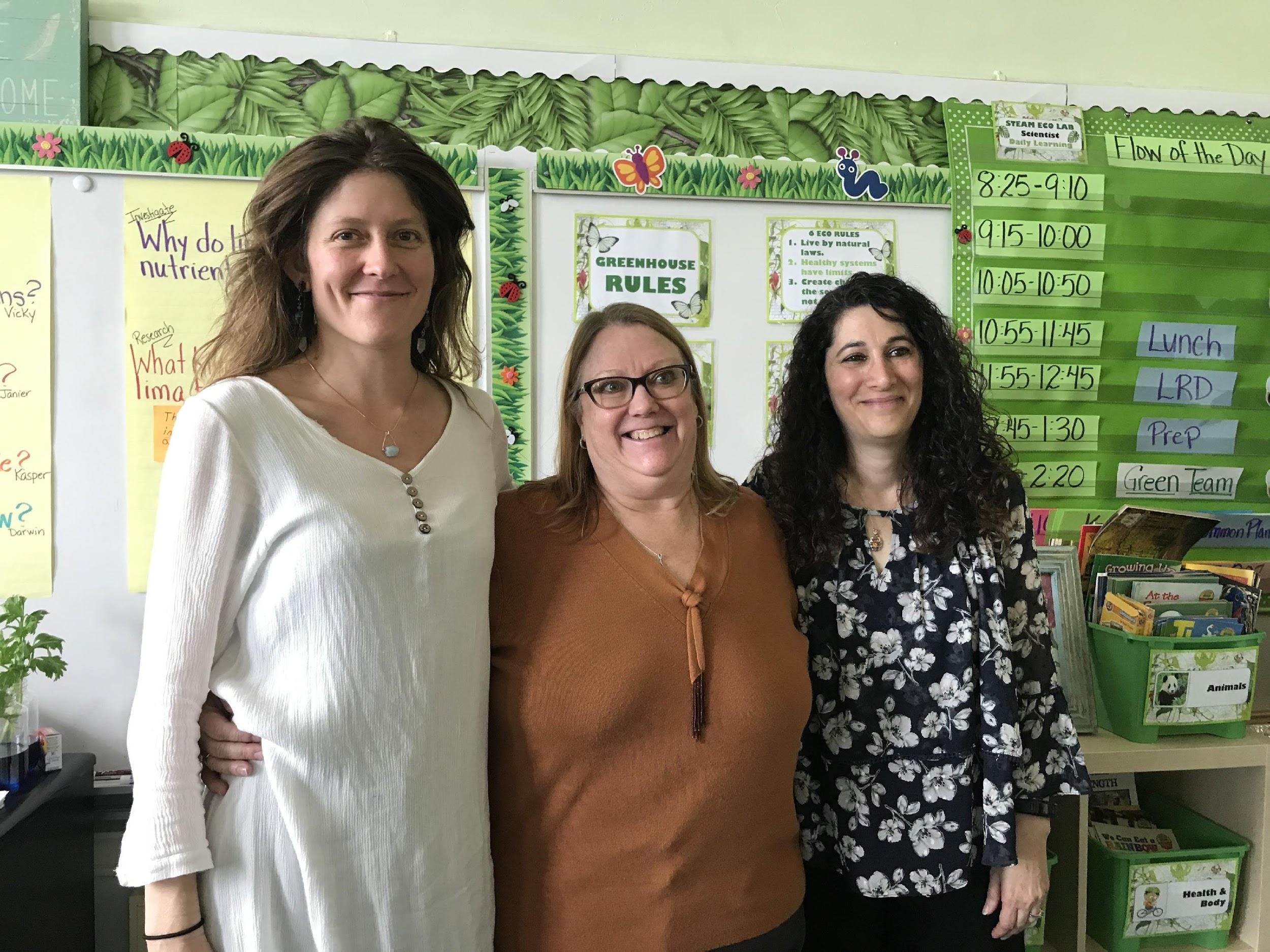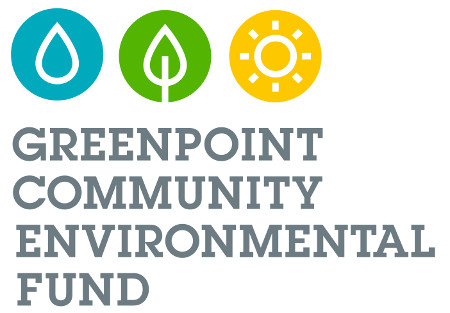Celebrating Sustainability w/PS 31 Teacher Sheri Sankner

At the four Greenpoint Eco-Schools, sustainability is a team effort. Behind every significant school environmental award, notable student achievement, or successful stewardship project are teams of dedicated individuals, family members, community partners, and−especially important−educators who know that environmental education plays a crucial role in our children’s future and the future of our planet. We want to introduce you to some of these dynamic leaders at the Greenpoint Eco-Schools and celebrate all they do to build a healthy, sustainable future for our community!
Meet Sheri Sankner. A Teacher and DOE Sustainability Coordinator at PS 31, Ms. Sankner is a tireless environmental champion, a passionate educator, and a true role model and leader for conservation education. Ms. Sankner’s list of accomplishments and awards during her tenure at PS 31 is extensive− among many other sustainability initiatives, she has also built relationships, established partnerships, written grants, obtained materials and resources, and designed professional development and trainings, for students, staff, and families at the school. Aided by her support, leadership, and vision, PS 31 has established sustainability as a priority and created meaningful educational experiences for every student.
A member of the Greenpoint Eco-Schools Teacher Team, Ms. Sankner incorporates environmental and sustainability concepts and practices throughout her K-2 Science and Social Studies curriculum; her students learn about the interdependence of natural systems and human communities, and how they can take make a difference at school, at home, and in their community.
It’s no understatement to claim that Ms. Sanker has inspired a love of nature and a stewardship ethic in hundreds (if not, thousands) of Brooklyn children. Get to know more about her by reading a selection of some her achievements below, and learning about the experiences that have influenced her journey to sustainability.
- Ms. Sanker launched the school’s first Green Team in 2014. The Green Team followed the Eco-Schools USA framework to address the Consumption and Waste Pathway and achieved the Bronze Award.
- In 2015, Ms. Sankner established the P.S. 31 school garden, known as The Garden of Happiness. She organized teams of families, partners, and students to build and plant raised beds. Each season the garden is planted with herbs, vegetables, and flowers which students and Green Team members learn about and help maintain during class lessons.
- In 2015, she developed Superhero roles for students (initially on the Green Team and extended into the classrooms accessible to all students in 2016). Roles included Waste Warriors, Energy Monitors, Guardians of the Garden, Water Sorcerers, and Healthy Heroes.
- Ms. Sankner worked with the PS 31 Green Team to lead the school to win the Go Green Brooklyn Festival Elementary School division two years in a row, in 2015 and 2016!
- In 2017, Ms. Sankner spearheaded the 2017 DOE Office of Sustainability Energy Challenge, which incorporated the theme, “Power Off And Turn On The Green”, and included a family logo contest, as well as classroom lessons, experiments, audits, student signs, posters and writing, and weekly student video messages; PS 31 won the challenge and received $10,000 for school projects (read more below)!
 \
\
What has inspired you to engage in environmental education and action? Why is it important to you?
Over the years, I have been inspired by the writings and incredible efforts of many environmentalists including Henry David Thoreau, John Muir, Rachel Carson, Chico Mendes, Jacques Cousteau, Julia Hill, and even environmentally-conscious musicians like Jackson Browne, James Taylor and Graham Nash whose bodies of work and lifestyle choices reflect a commitment to our Earth. More recently I’ve begun following many organizations that are making a difference in our world, including the National Wildlife Federation, the Environmental Working Group, Plastic Pollution Coalition, the Environmental Defense Fund, the Nature Conservancy, and the Guacamole Fund.
I believe that as global citizens and teachers of the future generation of environmental activists, we are the environmental stewards of our planet. Our beliefs, motivations, actions, and activities have long-term impact on the sustainability of our world. It is so important that we educate our students on the complex issues that are facing us today and the connections between economic prosperity, environmental health, and personal well-being
What sustainability milestones are you most proud of achieving at PS 31?
My work here at P.S. 31 has been so fulfilling and I marvel at the wonderment, compassion and understanding I see everyday on these beautiful faces as they delve into hands-on and nature based activities. There have been many milestones in our journey to sustainability. I am proud that we were the first school in Greenpoint to become an Eco-School and now we are part of an amazing team of four outstanding neighborhood Eco-Schools. I am proud of creating a strong Green Team and then diversifying it to fit two distinct age groups K-2 and 3-5. I am proud of building our outdoor school garden (with funding from grants from GrowNYC, Lowe’s Toolbox for Education, and IOBY online crowd-funding) and then launching our new Green STEAM Wing (including our Greenhouse classroom with hydroponic towers) this past Fall with Eco-Schools Legacy funding, Brooklyn Borough President Eric Adams’ office and Participatory Budgeting through Councilman Stephen Levin’s office. Now we can plant indoors and outdoors all year long and enjoy the benefits of nature-based classrooms. I am so proud of our school earning its Eco-Schools Green Flag last year after nearly four years of hard work. I am proud to be working with a dedicated teacher team, including Jackie Tesoriero, Kirsten Poveromo, Maria Puma, Irene Papadopoulos, and Alan Zaino, who infuse education for sustainability throughout our science and social studies curriculum. Finally, I am proud of our school winning the 2017 DOE Sustainability Energy Challenge. The whole school community came together on this amazing challenge reaching over 454 students with 64 different energy lessons and activities (not even including individual posters, logos, and home/family activities in just two short months.
Why is it important to teach children about sustainability and environmental responsibility?
It is vital that we teach children about sustainability and environmental responsibility and equity. We need to help broaden their scope of the world. Children need to understand that they are inclusive members of many communities in their lifetime (from their families all the way up to planet Earth). They need to know and see that their understanding and their active work can make a real, positive change in the world. They are never too young to feel that they can’t make a significant difference in the world. It is our job as teachers to help them grow and develop into leaders of change, to help them build the tools to become tomorrow’s advocates of energy and water conservation, as well as the proponents against pollution, climate change, and even animal cruelty.
What is your favorite place in Greenpoint to bring students to learn about the environment or inspire a love of nature? Greenpoint has two really beautiful parks, McCarren and McGolrick, and many community gardens that are ideal to see nature up close. I have enjoyed class field trips there for different activities, including neighborhood cleanups and scavenger hunts. I love working in the schoolyard garden with them and working with our various partners like Brooklyn Botanic Garden, NWF, Greening Greenpoint, and Trees NY.
What advice would you give an individual who wants to start being ‘greener’?
You can’t become “green” overnight. It’s something that takes time to develop and nurture. You have to take small, conscious steps. They really can make a difference. Do your research. Think about what is important in your life and community and what you can do to help. Take a class or workshop on the topic if you need more information. Then you’ll be better prepared to support those issues that mean the most to you. It could be waste and recycling, plastic pollution, climate change, animal rights, rainforest deforestation, organic gardening, energy conservation, water purity, or organic foods vs. GMO foods or those treated with pesticides. It really is a personal choice and how far you go with it depends upon you! Good luck on finding your green missions if it’s meant to be.





